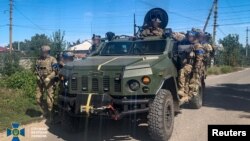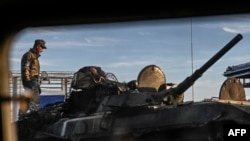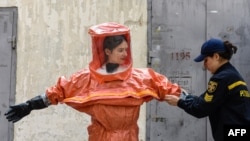Ukraine announced major advancements in a strategic military counteroffensive against Russian forces, retaking vital territory and cutting off a main supply line to thousands of Russian soldiers in northeastern Ukraine.
Ukrainian forces reported Saturday they had entered the town of Kupiansk and Izium and pushed Russian soldiers across the Oskil River in retreat. Ukrainian special forces published images on social media, which they said showed their officers, with the caption “in Kupiansk, which was and will always be Ukrainian.”
A regional official separately posted an image of Ukrainian soldiers in the town of about 27,000 people.
The region’s key rail and road links have been used for several months to supply Russian forces stationed in the nearby city of Izium, which is near the border between the Kharkiv and Donetsk regions.
Military analysts say Russia is believed to be sending reinforcements to the area, where it plans to launch new attacks against Ukrainian-controlled sections of Donetsk.
Russia’s Defense Ministry disputed Ukraine’s announcement, claiming its forces were holding their positions and returning heavy arms fire against the Ukrainians. Later in the day, however, the Ministry confirmed it had pulled its forces out of Izium.
A pro-Russia separatist leader also was quoted as saying that there was fierce fighting between Russian and Ukrainian forces in the Donetsk region.
Denis Pushilin said the situation in the town of Lyman was “very difficult” and that there was also fighting in “a number of other localities,” particularly in the northern part of the region.
Meanwhile, Moscow announced it was “regrouping” its forces in the eastern Kharkiv region of Ukraine. “To achieve the goals of the special military operation to liberate Donbas, a decision was made to regroup Russian troops stationed in the Balakliya and Izyum regions, to bolster efforts along the Donetsk front,” Russia's defense ministry said in a statement.
Ukrainian President Volodymyr Zelenskyy said in his nightly video address Friday that Ukrainian forces had retaken more than 30 settlements in the Kharkiv region.
“We are gradually taking control over more settlements, returning the Ukrainian flag and protection for our people,” Zelenskyy said.
The Ukrainian breakthrough near Kharkiv was the fastest advance reported by either side for months, and it is one of the biggest gains in the war since Russian forces abandoned a disastrous assault on the capital, Kyiv, in March.
Western military analysts say the advance puts the Ukrainians within striking distance of the main railway that Moscow has relied on to sustain its force in eastern Ukraine and could leave thousands of Russian troops at risk of being cut off.
In other developments, German Foreign Minister Annalena Baerbock made a surprise visit to Kyiv Saturday pledging Berlin's unwavering support for Ukraine in its battle against Russia.
“I have traveled to Kyiv today to show that they can continue to rely on us. That we will continue to stand by Ukraine for as long as necessary with deliveries of weapons, and with humanitarian and financial support,” Baerbock said in a statement. It’s her second trip to Ukraine and comes a week after Ukrainian Prime Minister Denys Shmyhal’s trip to Berlin where he had repeated Kyiv's call for weapons.
Over the last weeks, Germany has sent howitzers, rocket launchers and anti-aircraft missiles to Ukraine.
Heavier weapons like anti-aircraft systems, rocket launchers mounted on pick-ups and anti-drone equipment are also due in a further military aid package worth over $500 million.
In Prague, U.S. Defense Secretary Lloyd Austin told a news conference Friday with his Czech counterpart, "We see success in Kherson now, we see some success in Kharkiv, and so that is very, very encouraging.”
The British Defense Ministry said in its intelligence report, “With Ukrainian operations also continuing in Kherson, the Russian defensive front is under pressure on both its northern and southern flanks.”
Nuclear fears
Meanwhile, shelling destroyed the power infrastructure at the Ukrainian city of Enerhodar where staff operating the Russian-held Zaporizhzhia nuclear power plant live, posing a growing threat to the plant, the U.N. nuclear watchdog said Friday.
The plant's off-site power supplies, vital lines of defense against a potential nuclear meltdown, have already been cut. And the shelling at Enerhodar has caused a lasting blackout there.
That has prompted Ukraine to say it may have to shut down the last operating reactor supplying power to Zaporizhzhia, including the cooling systems for the plant's nuclear fuel.
Zaporizhzhia's operator is not confident that off-site power can be restored and that is prompting it to consider shutting down the last operating reactor, International Atomic Energy Agency chief Rafael Grossi said in a statement.
"The entire power plant would then be fully reliant on emergency diesel generators for ensuring vital nuclear safety and security functions. And as a consequence, the operator would not be able to restart the reactors unless off-site power was reliably reestablished," he added.
"This is an unsustainable situation and is becoming increasingly precarious. Enerhodar has gone dark. The power plant has no off-site power. And we have seen that once infrastructure is repaired, it is damaged once again," Grossi said.
Ukraine and Russia have blamed each other for shelling near Zaporizhzhia in southern Ukraine and within the perimeter of Europe's biggest nuclear power plant, which has six reactors.
"This is completely unacceptable. It cannot stand," Grossi said.
"I therefore urgently call for the immediate cessation of all shelling in the entire area. Only this will ensure the safety and security of operating staff and allow the durable restoration of power to Enerhodar and to the power plant."
Grossi this week called for the creation of a "nuclear safety and security protection zone" around Zaporizhzhia, repeating his call Friday.
Military aid
The United States said Thursday that it planned to send $2.2 billion in long-term military aid to Ukraine and 18 other European countries threatened by Russian aggression, and another $675 million directly to the Kyiv government in a new munitions package to fight Moscow's invasion.
U.S. Secretary of State Anthony Blinken, who met with Zelenskyy in Kyiv Thursday, said the $2.2 billion would "bolster the security of Ukraine and 18 of its neighbors, including many of our NATO allies, as well as other regional security partners potentially at risk of future Russian aggression."
European Union finance ministers Friday backed a $5 billion loan for Ukraine to help it keep schools, hospitals and other state operations running as it fights against Russia's invasion, the Czech Finance Ministry said.
The loan, to be backed by guarantees of EU member states, is part of an overall $9 billion package announced in May. The first $1 billion was sent in early August.
Czech Finance Minister Zbynek Stanjura, who was hosting EU finance ministers Friday in Prague, said in a statement that upcoming meetings would decide how the remaining $3 billion in the package could be split into loans or grants.
Some information for this report came from Reuters and The Associated Press.









